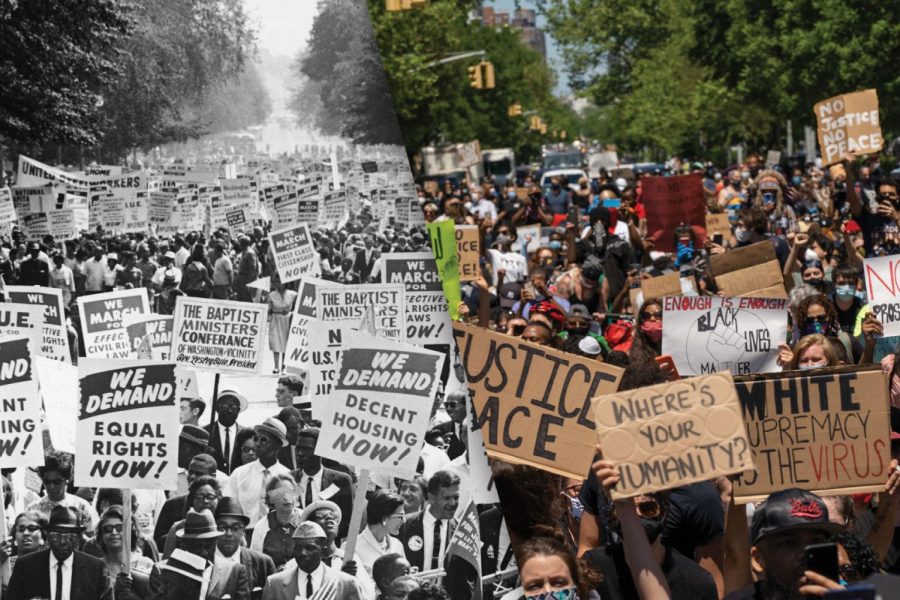It’s About How Long You Run Fast
Courtesy of Hulton Archive/Getty Images; David 'Dee' Delgado — Getty Images
Left: Between 200,000 and 500,000 demonstrators march down Constitution Avenue during the March on Washington for Jobs and Freedom, Washington D.C., Aug. 28, 1963; Right: Protesters gather in Harlem to protest the death of George Floyd on May 30, 2020 in New York City.
June 19, 2020
In the sixth grade, I joined my school’s cross-country team. My friend’s mom made a couple of us sweatshirts with the quotation, “It’s not about how fast you run, it’s about how long you run fast.” The quotation has a message similar to the idea, “It’s a marathon, not a sprint.” In other words, don’t waste all of your energy at the beginning and make sure you can finish. Personally, I’ve preferred the idea of “how long you run fast,” because it’s not about simply doing something that will take a long time but being able to exert energy and strength throughout that duration of time.
We are living through a very unique time for many reasons, but the Black Lives Matter protests occurring around the world have made their way to the forefront of many people’s conversations. The protests are in direct response to the murder of George Floyd, but they are also in protest of the systemic racism that has remained present in the U.S. for far too long.
We’ve seen such protests before; in recent years, the public has become increasingly aware of how deadly racism and police brutality have the potential to be. There is usually protesting and some rioting that the media will cover for a couple of days before moving on to the next story, and while fear and frustration grow within Black communities, those who don’t have to think about what they will do when they get pulled over move on with their lives. Within that group, there are those who were never demonstrated support, but there are also those who showed up and helped. However, after those people have their conversations and attend their protest, they feel as though they’ve completed their job. They run fast, and they are satisfied.
This is not everyone, but it is an overwhelming majority of people. Those people aren’t evil; they’re human. I’m guilty as well, considering that our lives are often a spiral of new information. We are constantly learning about new problems around the world while dealing with our own, but that does not mean we are exempt. It’s important to be mindful of our complacency and ensure that we are not essentially contributing as much for the movement as those who didn’t care in the first place. Each of us has a responsibility to pay attention to the system that we directly benefit from as it shuts out others.
Today, however, it’s clear that there has been a shift. Almost three weeks have gone by since Floyd’s murder, and each of them has been filled with protests. What creates an inspiring sense of perseverance is the unique challenges protesters face. For starters, we are in the midst of a global pandemic that has caused lockdowns due to an extreme emphasis on staying socially-distanced. Though some restrictions have been eased, millions are risking their health for this fight. Furthermore, videos of police officers using tear gas, rubber bullets and extreme force have flooded the internet. The use of rubber bullets and tear gas has already been the direct cause of one death and many injuries. Everyone knows that when they go to join a protest, there is a risk that they too will be met with such violence; yet, for three weeks, people across the globe have continued to show up and use their voice, amplifying the fact that many will not tolerate such hatred anymore.
Furthermore, continued coverage of the protests has led to increased discussion. Whether through news outlets or social media platforms, the conversation has continued to surround Black Lives Matter. More people are becoming aware of the institutions in place, starting conversations that they know won’t be easy, donating money and signing more petitions than ever before.
In the midst of all this action and conversation, the world has seen some incredible effects. In the U.S. and the U.K., statues of confederate leaders and racist individuals are being taken down. Laws are being passed in states across the U.S. to restrict police brutality. There is a growing movement to defund the police, with a push to encourage de-escalating situations rather than elevating them. A Police Reform and Racial Justice Group has been formed in eight states. Certain organizations, like the NFL and Anthropologie, who made statements in support of BLM, are being called out for hypocrisy, highlighting the public’s awareness of malpractice. All of these legal and societal changes are the results of the combination of so many people demonstrating their support, showing up, signing petitions, voicing their anger, sharing information and so much more for an extended period of time.
So, continue to run fast for as long as you can. I’m aware that protests will become more infrequent, but continue to show your support. Keep having hard conversations. Vote. Step in when you know you can help. Exercise your privilege to learn more about discrimination rather than face it. Call out your friends when they say something they shouldn’t and help them learn that by saying such things, they are hurting the movement that is long overdue. Change doesn’t come overnight, and we all have to remember to stay vocal.










